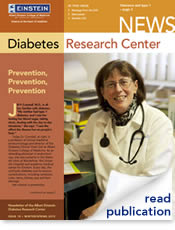

FULL STORY
Prevention, Prevention, Prevention
Q: What are some of the lesser-known complications of diabetes?
A: Diabetes can affect the skin, mouth, bones and hearing. And new findings point to a possible association between insulin resistance and Alzheimer’s disease. Researchers found that type 2 diabetes patients with higher insulin resistance had greater damage to the brain’s gray matter than type 2 individuals with lower insulin resistance.
Dr. Jill Crandall is all too familiar with diabetes. “My mother had type 1 diabetes, and I saw her testing her blood sugar, taking shots, dealing with the day-to-day intrusions,” she says. “I saw the effect the disease has on people’s lives.”

This article originally appeared in the winter/spring 2015 issue of the Albert Einstein Diabetes Research Center newsletter.Today Dr. Crandall is a professor of clinical medicine (endocrinology) and director of the Diabetes Clinical Trials Unit at Albert Einstein College of Medicine. As an attending physician in endocrinology, she sees patients in the diabetes clinic at Montefiore, the University Hospital and academic medical center for Einstein. Every day, she confronts diabetes and its serious complications, including cardiovascular, nerve, kidney, eye and foot damage.
Her mission is prevention.
Preventing Diabetes
Dr. Crandall is Einstein’s principal investigator (PI) for the multicenter Diabetes Prevention Program Outcomes Study, supported by the National Institutes of Health (NIH). People enrolled in this study started out with prediabetes—blood sugar that’s elevated but not quite at the diabetes level. “This study was designed to show how well diet and exercise, or the oral drug metformin, prevent or delay type 2 diabetes in people at high risk,” says Dr. Crandall. The research program showed that type 2 diabetes can indeed be prevented or delayed. Follow-up will tell whether these treatments will prevent diabetes complications.
Dr. Crandall is also investigating whether the red wine extract resveratrol can prevent diabetes. In a pilot study involving 10 patients with prediabetes, she found that resveratrol improved insulin sensitivity and blood sugar levels following meals. A $600,000 grant from the American Diabetes Association has allowed her to conduct a larger study. Participants receive resveratrol capsules rather than red wine, since it would take hundreds of bottles daily to reach therapeutic levels. “There have been a lot of health claims made for resveratrol based on relatively little evidence,” she says. “Our goal is to find out if these assertions are true.”
Preventing Complications
A challenge for diabetes researchers is preventing diabetes’ dangerous complications (including cardiovascular, nerve, kidney, eye and foot damage). Such complications afflict people with both type 1 and type 2 diabetes and result from abnormally high blood levels of sugar, which damage tissues throughout the body. The landmark Diabetes Control and Complications Trial, conducted at Einstein and 28 other sites in the United States and Canada during the 1980s and 1990s, provided clear and convincing evidence that controlling blood sugar is the key to preventing these complications.

Jill Crandall, M.D.An Einstein-Montefiore team is taking part in a major NIH-supported effort to prevent diabetes complications, called the Glycemia Reduction Approaches in Diabetes: A Comparative Effectiveness Study (GRADE). “This nationwide clinical trial is looking for the most effective combination of glucose-lowering medications,” says Dr. Crandall. She and Diane McKee, M.D., associate professor and codirector of the research division in the department of family and social medicine, are spearheading GRADE at Einstein. Why here? “Unfortunately, our diverse Bronx population has a high rate of type 2 diabetes,” says Dr. Crandall. “With our clinical research center and Montefiore as our clinical partner, we’re well positioned to carry out this important trial.”
Dr. Crandall is also the Einstein PI for Preventing Early Renal Loss. This study, sponsored by the NIH and the Juvenile Diabetes Research Foundation, is testing an old drug (allopurinol) for a new purpose: protecting kidney function in people with type 1 diabetes. Controlling blood sugar and blood pressure and using blood pressure medications called RAS blockers doesn’t prevent kidney disease in everyone at risk. “This study has the potential to change the way diabetic kidney disease is treated and improve the outlook for many patients with diabetes,” says Dr. Crandall.
Posted on: Thursday, May 21, 2015

Tablet Blog